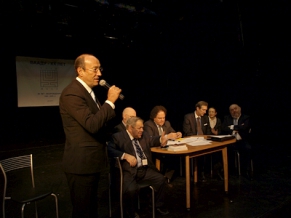|
Euroasian Jewish News

Speech of EAJC President Alexander Mashkevich
|
EAJC President Salutes Vaad Russia Congress
02.12.2009 On December 2, on the premises of the Moscow theater “Shalom,” a jubilee congress of the Federation of Jewish Organizations and Communities (Vaad Russia), has taken place. It was timed to the 20th anniversary of the First Founding Congress of Vaad USSR, the first pan-USSR independent legal Jewish community. The creation of the Vaad USSR in 1989 became a momentous event, the beginning point for the rebirth of Jewish community life in the USSR and in post-Soviet space.
The President of the Euro-Asian Congress (EAJC) Alexander Mashkevich greeted the gathering. He gave thanks to those who have “spent their strength and health for dozens of years on the struggle for the possibility of the official existence of Jewish life.” Upon underscoring that the idea of the creation of the Euro-Asian Jewish Congress existed as early as twenty years ago, Mashkevich states that the main task of the EAJC is to unite and coordinate the efforts of Jewish organizations of the Eurasian region so that they may be directed at the most important point for communities of a country or even of the entire region. “Let us be active, let us not tire of our everyday struggle,” the EAJC President summarized.
The President of the Russian Jewish Congress (RJC) Yuri Kanner called for the union of Jewish organizations of the FSU in his speech. “We must discuss the questions of that which unites us, and understand the conditions in which our colleagues in other countries work.”
The President of the Vaad Russia Michael Chlenov noted on his part that the competitive atmosphere which existed earlier between various Jewish organizations is gradually being replaced with an atmosphere of cooperation and coordination of activity.
The Secretary General of the World Jewish Congress (WJC) Michael Schneider read the salutations of the WJC President Ronald Lauder, in which a hope for the continuation of cooperation between the Vaad, the EAJC, and the WJC was expressed. The head of the Israeli liaison bureau Likshat Hakesher, also known as Nativ, Naomi ben Ami, also sent her greetings.
EAJC Secretary General Michael Chlenov was once again elected to the post of President of Vaad, and thus retains this position since 1992. Famous businessman Vladimir Shternfeld was elected Vice-President.
As part of the Vaad Russian congress, the round table “Twenty Years After. Jewish Communities of the Post-Soviet Territory: Problems and Future Challenges (a view from Moscow, Kiev, Jerusalem, and New York)” took place. Those who shared their view of the current challenges to post-Soviet Jewry were: Chairman of the EAJC General Council, Chairman of the Vaad Ukraine Josef Zisel, the Israeli political researched Zeev Hanin, the Executive Director of the National Conference on Soviet Jewry (NCSJ) Mark Levin, scholar of anti-Semitism and xenophobia, member of the EAJC General Council Vyacheslav Likhachev, the demographer Mark Kupovetsky, researc hr and journalist Semen Charny, and other scientists and community activists. The Moscow round table became a continuation of the dialogue begun in may 2009 in Riga, where the 20th anniversary of the Riga round table, where the decision to establish the Soviet Union Vaad was made in 1989. In May 2009, this anniversary initiated a reflection upon the road travelled by post-Soviet Jewry, and in Moscow the 20th anniversary of the creation of Vaad USSR became a reason to think about the future.
|
|
